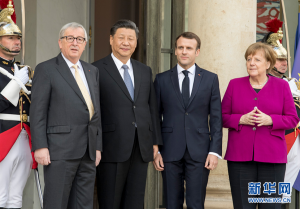Christie’s wins battle for a new interpretation of the “Droit de Suite” regulation in France.
A recent decision of the French Supreme Court[1] is going to overturn the law in France that requires the Artist’s Resale Right (Droit de Suite) being paid by vendors.
 The resale right forms an integral part of copyright and is an essential prerogative for authors.
The resale right forms an integral part of copyright and is an essential prerogative for authors.
It is an unassignable and inalienable right, enjoyed by the author of an original artistic work, or their heirs, to an economic interest in successive sales of the work concerned.
The resale right is intended to ensure that the artist receives part of the resale value of a work of art. Read more

 The trend is toward considering the exhibits provenance in museums and galleries across Europe
The trend is toward considering the exhibits provenance in museums and galleries across Europe
 On the third day of Chinese President Xi Jinping’s visit to France, the French President Emmanuel Macron took the unprecedented step of establishing a united European front to compete with China’s global hegemony, specifically China’s One Belt One Road strategy. Macron invited EU leaders Angela Merkel and Jean-Claude Juncker to join the meeting with Xi. This meeting was referred as a “high-level meeting on the challenges of multilateralism” by the French government. The core of this meeting was the discussion of climate change and multilateral relations between Europe and China. Macron’s intention of forging a United European front upon Xi’s visit cannot be easily assumed, however, it can be assumed that Macron keeps a questioning attitude towards the two-way street of investment and trade between the Europe and China regarding China’s Belt and Road Initiative.
On the third day of Chinese President Xi Jinping’s visit to France, the French President Emmanuel Macron took the unprecedented step of establishing a united European front to compete with China’s global hegemony, specifically China’s One Belt One Road strategy. Macron invited EU leaders Angela Merkel and Jean-Claude Juncker to join the meeting with Xi. This meeting was referred as a “high-level meeting on the challenges of multilateralism” by the French government. The core of this meeting was the discussion of climate change and multilateral relations between Europe and China. Macron’s intention of forging a United European front upon Xi’s visit cannot be easily assumed, however, it can be assumed that Macron keeps a questioning attitude towards the two-way street of investment and trade between the Europe and China regarding China’s Belt and Road Initiative. 
 The Internet has become the second space in human life, changing people’s production and lifestyle, refreshing the concept of law, judicial practice and public demand for court services. The characteristics of virtuality, cross-regionality, and decentralization of the Internet have created enormous challenges to the existing legal theory and judicial system. Parties who are used to the traditional judicial rules and litigation methods are facing high cost and long process for distant disputes, which is not efficient at all, thus an online solution channel is in high need. These facts have made the Central Committee in China decide to set up more Internet court.
The Internet has become the second space in human life, changing people’s production and lifestyle, refreshing the concept of law, judicial practice and public demand for court services. The characteristics of virtuality, cross-regionality, and decentralization of the Internet have created enormous challenges to the existing legal theory and judicial system. Parties who are used to the traditional judicial rules and litigation methods are facing high cost and long process for distant disputes, which is not efficient at all, thus an online solution channel is in high need. These facts have made the Central Committee in China decide to set up more Internet court. European Court of Justice (ECJ) rules that ‘The Pirate Bay’ infringes copyrights
European Court of Justice (ECJ) rules that ‘The Pirate Bay’ infringes copyrights Although Spinners are a great success in schoolyards all around the world, their creator, Catherine Hettinger, a 62-year old American citizen, does not benefit from this creation.
Although Spinners are a great success in schoolyards all around the world, their creator, Catherine Hettinger, a 62-year old American citizen, does not benefit from this creation. EU Parliament makes sure that you can watch your favourite shows during your holidays
EU Parliament makes sure that you can watch your favourite shows during your holidays  Article 4 of the
Article 4 of the